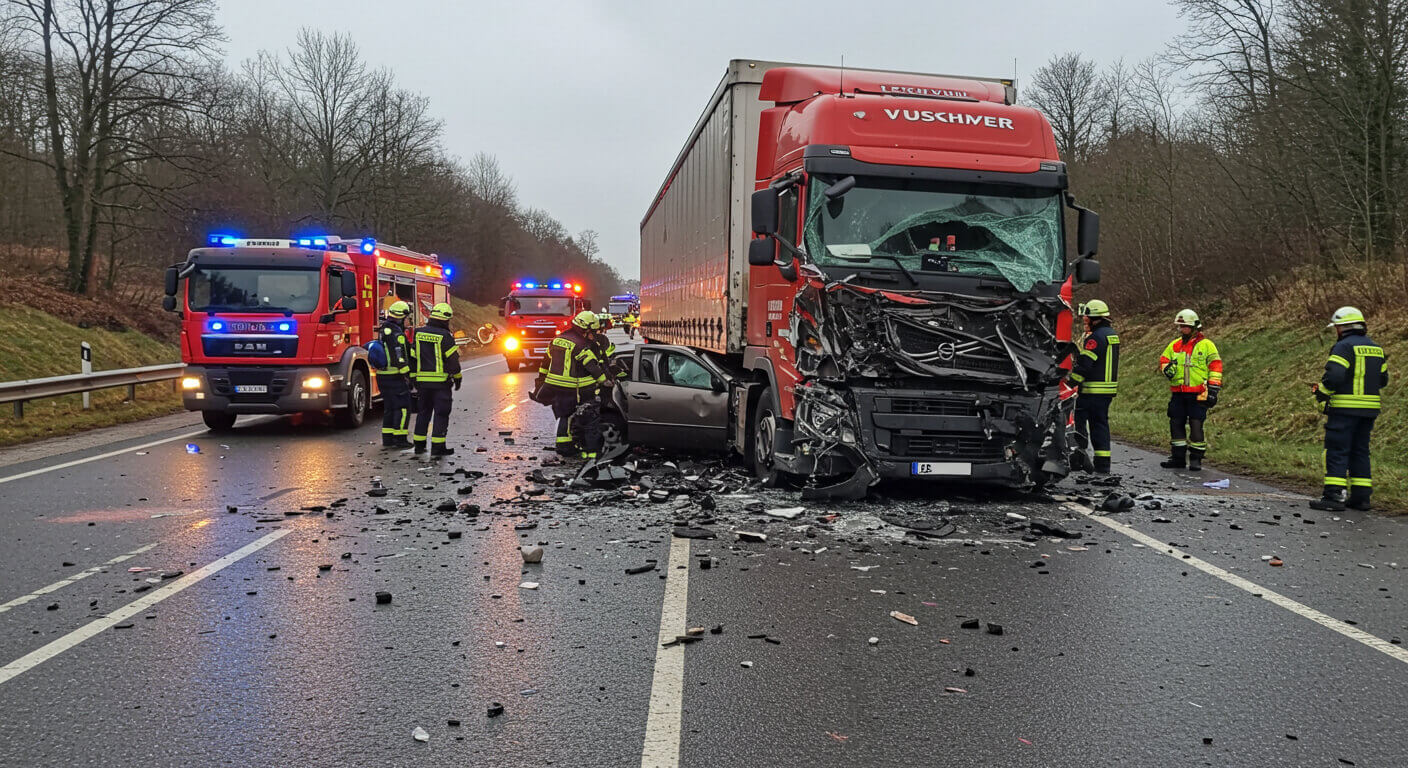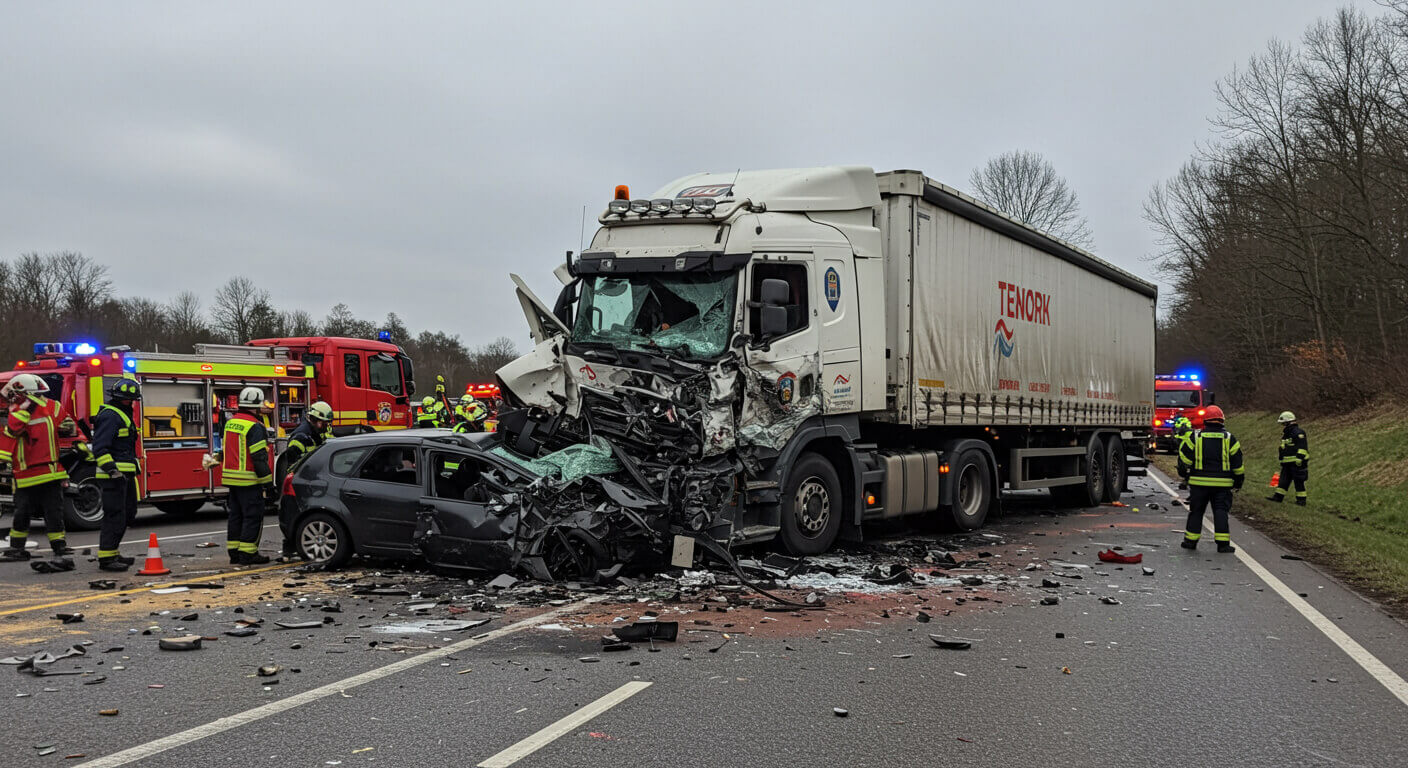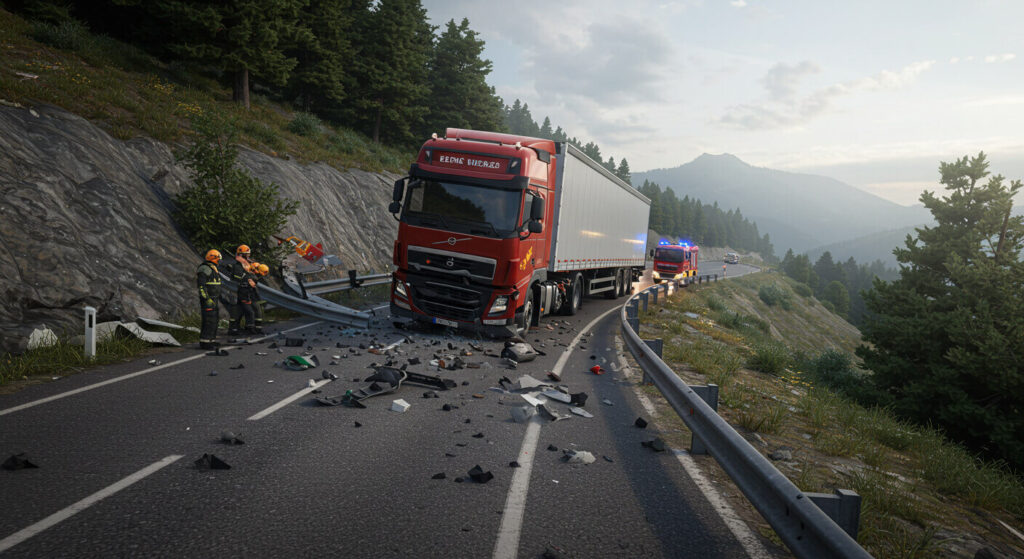A collision with a commercial truck can turn your world upside down in seconds.
Understanding truck accident liability becomes critical to protecting your rights when serious injuries and financial stress follow.
Unlike typical car crashes, these accidents often involve multiple parties—from the truck driver to the employer, maintenance crews, or even manufacturers, each with their own potential role in what went wrong. Pinpointing responsibility is the key to building a strong claim and securing fair compensation.
At Azam Law Firm, we are dedicated to uncovering the truth and holding every negligent party accountable on your behalf.
In this blog, you will learn:
- Which parties may be legally responsible after a truck crash
- What types of evidence strengthen your case
- How Texas law handles shared fault and liability
Let’s start by breaking down how truck accident liability works in Texas.
Understanding Truck Accident Liability in Texas
In Texas, truck accident liability stems from negligence. This means that if someone did not exercise their duty of care, they may be at fault.
The truck driver, the trucking company, and anyone else in the industry must act safely. They should drive with care and keep the vehicles in good shape. Driving carelessly, not keeping up with vehicle maintenance, or failing to secure their cargo can cause bad accidents.
Texas law looks at what each person or company did before the accident to determine who is responsible. For example, if the truck driver broke the rules or the trucking company set unfair deadlines, each of these actions is considered. Evidence is very important in these cases. Black box data and accident scene photos help show who should be held liable.
A truck accident can have many factors. This is why a thorough investigation is needed. It ensures all negligent parties are found and helps victims get fair compensation.
Key Parties Who May Be Held Liable in a Truck Accident

A truck accident often includes more people than just the driver.
The trucking company, the cargo loaders, or sometimes even government entities, can be involved or be the liable party.
Sometimes, truck drivers are blamed for things like driver fatigue or breaking safety rules. But problems can also come from trucking companies’ bad choices with vehicle maintenance or not watching their drivers well enough.
People hurt in these crashes and making a personal injury claim need to be sure to check for every possible liable party. This can make personal injury cases stronger and give more ways to get paid.
The Truck Driver’s Role and Responsibility
The truck driver has a big job keeping the road safe. They must follow all traffic laws and trucking rules and drive safely. However, problems like driver fatigue, not paying attention, and speeding often cause accidents with large trucks. When drivers break the rules about how many hours they can drive, there can be very serious consequences.
At the accident scene, not being careful can often show that the driving was not safe. For example, if the driver is texting or drinking alcohol, this breaks the duty of care. Looking at the driver’s records, like their logs and drug test results, can help people find important clues about who is at fault.
But the truck driver is not always the only one to blame. Sometimes, they do things because the company pushes them to meet tight deadlines. To know how much the truck driver is responsible, people have to look at everything closely. This may show that bigger problems in the trucking industry lead to these mistakes.
Liability of Trucking Companies and Employers
Trucking companies and employers are involved in many truck accidents because of vicarious liability. This means the employer can be blamed for what its drivers do while working. It’s not just about the worker. The company may also be at fault if it does not follow federal regulations, skips vehicle maintenance, or tells workers to drive in a way that is not safe.
Some key factors, like maintenance records or fake driver logs, can show how the company has not done what it should. For example, if the company tells the driver to skip hours-of-service rules, this can cause driver fatigue, which is very bad for road safety.
Insurance companies that represent trucking firms can also make personal injury claims harder. Victims have to deal with their legal teams and might have to find out about broken federal regulations to show who is at fault. Looking at both what the company does across the whole business and how the driver acts lets victims make a stronger personal injury claim. This helps the company answer questions about what it has done and can also increase the number of victims that can be compensated.
Additional Potentially Liable Parties
Liability may reach more groups besides the trucking company or the truck driver.
Potentially liable parties might be cargo loaders, truck manufacturers, or people who do truck maintenance. Sometimes, bad equipment, like broken brakes, indicates a problem with the truck’s construction. In other cases, cargo that isn’t put in correctly can cause accidents.
A thorough investigation needs to look at every part of the problem. This includes finding out if there was a defective product, or if the shippers or the people who do maintenance were not careful enough. Finding all of these possible issues lets victims try to get full damages from each person or group that is responsible.
Cargo Loaders and Shippers
Improperly loaded cargo is often one of the common causes of truck accidents.
When cargo loaders and shippers do not stay within weight limits or forget to tie down loads, the risk of a truck crash goes up. This can lead to rollovers, brake problems, or even dangerous spills. Here are a few common causes of truck accidents that happen when the cargo gets mishandled:
- Loads move around during the drive because the weight was not put in the right way.
- Dangerous materials are not handled safely.
- Trailers get packed with more weight than they should carry.
It is important to have shipping documents and load lists, as these can show who was at fault. A thorough investigation of what cargo loaders did can help everyone understand how the accident scene happened. This makes it easier to ensure the right people are held responsible when there is a lot of damage or someone gets hurt.
People who get hurt should always check out details from the accident scene so they have proof if cargo loaders acted negligently.
Truck Manufacturers and Maintenance Providers
Truck manufacturers have a big job when it comes to keeping their trucks safe on the road.
Under Texas law, manufacturers can be held responsible if defective products, like bad brakes or tires, lead to mechanical failures. At the same time, maintenance providers can also be at fault. If they skip important repairs, like changing out worn tires or making sure the brakes work, this can cause accidents.
Maintenance logs are important. These records often show if someone ignored safety standards. In crashes where people get hurt, it’s important to check if any manufacturing defects made a driver’s mistake worse.
Holding truck manufacturers and the people who service the trucks responsible can help make the roads safer for everyone. When you have good evidence of their neglect, you can strengthen your case and raise the chance of getting fair compensation after mechanical failures.
Determining Fault After a Truck Accident

After a truck accident, the people looking into what happened need to check important evidence. This can be things like black box data, witness statements, and photos from the accident scene. A thorough investigation helps find out who or what played a part in causing the crash.
Here is a table that shows the main proof used for these cases:
| Category of Evidence | How It Establishes Fault |
| Driver logs | Shows if the driver followed or broke the rules. |
| Black box data | Tells about speed, braking, and other actions by the driver. |
| Maintenance records | Finds out if the truck was taken care of well. |
| Cargo loading documents | Shows if the load was tied down the right way. |
| Witness statements | Gives details about how things looked and what people did. |
By combining all this evidence, people involved in the crash strengthen their cases, which helps them get fair compensation for what happened.
Gathering Critical Evidence at the Scene
Collecting vital evidence at the accident scene is essential to supporting claims about who is at fault. For visual proof, you should take photographs of vehicle damage, skid marks, and the area around the crash. Witness statements are helpful because they describe what people saw and how everyone acted just before the crash.
In addition to evidence from the accident scene, you should get truck maintenance records or ask for black box data as soon as you can. This helps prevent any chance of it being changed or lost. Logs about driver fatigue or how the brakes worked can show if someone was not being careful.
It is a good idea for victims to work with experts to rebuild what happened during the accident as part of the investigation. If you have strong proof from the start, you will have a good way to show who was at fault.
The Impact of Comparative Fault Rules in Texas
Under Texas law, comparative negligence plays a big part in personal injury cases. When a person is partly at fault for a truck accident, the money they get goes down by that same percentage of blame. For instance, if the court says you are 30% at fault, you can only get 70% of the damages.
This rule is essential for people who want fair compensation. If you know everyone who is responsible, you can stop others from putting too much blame on you. Getting help from a lawyer can explain things and make it easier to claim what is right. This can also help you get the most from your case.
Final Thoughts
Determining truck accident liability is rarely simple, especially when multiple parties—drivers, employers, and manufacturers—may have contributed to what happened.
What matters most is clearly understanding your rights and the legal options available to you under Texas law. With so much at stake after a serious truck crash, gathering strong evidence and identifying every liable party can make all the difference in your recovery.
At Azam Law Firm, we understand the physical, emotional, and financial toll these accidents take. That’s why we take the time to investigate thoroughly, build a compelling case, and fight for the full compensation you deserve. Whether it’s negotiating with insurance companies or standing up in court, we are here to advocate for you every step of the way.
Call us today on (832) 674-0879 or fill out our online form to get a free consultation and learn how we can help protect your future.
Frequently Asked Questions
Can multiple parties be responsible for a single truck accident in Texas?
Yes, in Texas, multiple parties can be held responsible for a single truck accident. Liability may fall on the truck driver, the trucking company, the cargo loaders, the vehicle maintenance team, or even the manufacturer of a defective truck part. Investigators will review driver logs, maintenance records, and cargo handling procedures to determine all responsible parties.
What if I were partially at fault for the accident?
Texas follows a modified comparative negligence system, as outlined in Texas Civil Practice and Remedies Code § 33.001. This means you can still recover compensation if you were not more than 50% at fault for the accident. However, the percentage of fault assigned to you will reduce your total recovery.
How long do I have to file a truck accident claim in Texas?
In Texas, you have two years from the date of the truck accident to file a personal injury lawsuit, as established in the Texas Civil Practice and Remedies Code § 16.003. Failing to file within this period typically means you lose your right to seek compensation, no matter how strong your case is.
What kind of compensation can I recover after a truck accident?
If you’ve been injured in a truck accident in Texas, you may be entitled to compensation for medical expenses, lost wages, property damage, pain and suffering, and emotional distress. In cases involving wrongful death, surviving family members may recover additional damages, including funeral costs and loss of companionship.
Do I need a lawyer to pursue a truck accident case in Texas?
While it’s legally possible to file a truck accident claim on your own, it is not recommended. Truck accident cases often involve complex federal and state regulations, multiple defendants, and high-stakes negotiations with insurance companies and trucking corporations. An experienced truck accident attorney can help you gather evidence, navigate the legal system, and fight for fair compensation.


